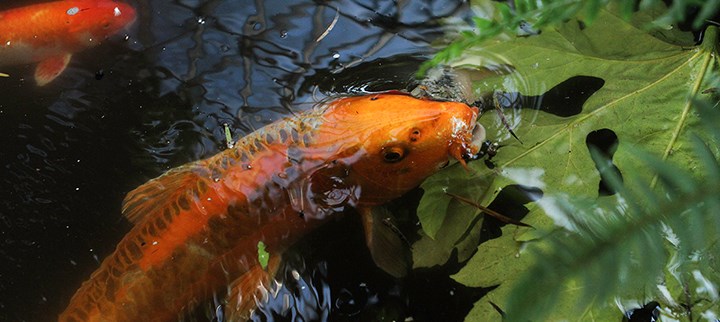After three eventful decades, this tenacious Koi fish is settling into his forever pond at Vancouver's Bloedel Conservatory.
The 34-year-old koi, named Dragon Gate, was recently relocated to a newly rehabilitated pond in the conservatory, a 50-year-old tropical oasis and heritage building located in Queen Elizabeth Park atop the City of Vancouver’s highest point.
His new home is a well-deserved respite for Dragon Gate, who is believed to be the oldest koi in Vancouver. Life hasn't been a swim in the park since he first arrived in the City to participate in Expo ’86, residing in the Korean pavilion. After finding a long-term home at Dr. Sun Yat-Sen Classical Chinese Garden following the Expo, Dragon Gate proved just how tough Koi can be in 2018, when he survived the first tragedy to strike the Koi pond: the arrival of a rogue river otter, who nearly succeeded in wiping out the Koi population. Dragon Gate was rescued from the pond and eventually returned to its waters, only to face—and survive—yet another river otter attack the following year.
“We are pleased to provide a safe home in a newly rehabilitated pond for Dragon Gate," said Camil Dumont, chair of the Vancouver Park Board in a release.
“He has several scars on his back as a result of surviving the otter attacks at Dr. Sun Yat-Sen Classical Chinese Garden and we couldn’t be happier to have him join the unique environment at Bloedel where he can continue to play an important role in Vancouver.”
In his new home, Dragon Gate will live alongside nine other koi, and can now claim more than 150 free-flying exotic birds and 500 exotic plants and flowers as his neighbours.
According to the release, Bloedel Conservatory's pond required rehabilitation due to the overbreeding of goldfish, which shared the space with koi and produced much more waste. "The pond has been cleaned and the koi will no longer share the space with the goldfish, who have been moved to other locations," read the release.
Dragon Gate will likely enjoy his new pond for many years to come: koi can live up to 100 years of age, the City explained in the release, while each fish's price is evaluated from the quality of specific color marking and lineage.






